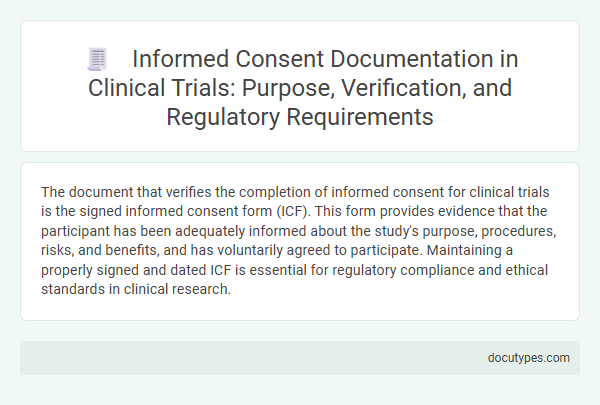The document that verifies the completion of informed consent for clinical trials is the signed informed consent form (ICF). This form provides evidence that the participant has been adequately informed about the study's purpose, procedures, risks, and benefits, and has voluntarily agreed to participate. Maintaining a properly signed and dated ICF is essential for regulatory compliance and ethical standards in clinical research.
Introduction to Informed Consent in Clinical Trials
Informed consent is a critical process in clinical trials that ensures participants understand the study's purpose, risks, and benefits before enrolling. It protects your rights and promotes transparency in medical research.
- Informed Consent Form (ICF) - A detailed document that outlines all aspects of the clinical trial and is signed by the participant to confirm understanding and voluntary participation.
- Consent Documentation - The signed ICF serves as legal proof that informed consent was obtained according to regulatory standards.
- Ethics Committee Approval - The clinical trial's consent process and documents are reviewed and approved by an ethics committee to ensure participant protection.
The signed informed consent form is the official document verifying the completion of informed consent in clinical trials.
Purpose of Informed Consent Documentation
| Aspect | Details |
|---|---|
| Document Name | Informed Consent Form (ICF) |
| Purpose | Verifies that the participant has received comprehensive information about the clinical trial, including potential risks, benefits, procedures, and rights, ensuring voluntary participation. |
| Content | Clear explanation of study objectives, treatment plan, possible side effects, alternative treatments, confidentiality assurances, and voluntary withdrawal options. |
| Legal and Ethical Role | Serves as a legally binding agreement and ethical confirmation that the participant's consent was informed and documented according to regulatory standards. |
| Clinical Trial Compliance | Essential for adherence to Good Clinical Practice (GCP) guidelines and regulatory requirements by agencies such as FDA and EMA. |
| Verification Method | Signed and dated form retained in the participant's medical records and the trial master file for audit and monitoring purposes. |
Key Elements of Informed Consent Forms
What document verifies the completion of informed consent for clinical trials? The informed consent form (ICF) is the primary document that confirms a participant's agreement to join a clinical trial after understanding the risks and benefits. This form details critical elements like the purpose of the study, procedures involved, potential risks, benefits, and participant rights.
Regulatory Standards for Informed Consent Documents
The document that verifies the completion of informed consent for clinical trials is the signed informed consent form. Regulatory standards require this form to clearly outline the study's purpose, procedures, risks, and benefits to ensure participant understanding. You must retain this signed document as proof of compliance with ethical and legal guidelines established by authorities such as the FDA and ICH-GCP.
Verification and Audit of Consent Records
The document that verifies the completion of informed consent for clinical trials is the signed Informed Consent Form (ICF). This form serves as a critical record during verification and audit processes, ensuring that participants have voluntarily agreed to the trial after understanding its risks and benefits. Auditors examine the ICF alongside consent logs and source documents to confirm compliance with regulatory and ethical standards.
Essential Steps in Documenting Informed Consent
The document that verifies the completion of informed consent for clinical trials is the signed informed consent form (ICF). This form serves as legal proof that the participant understands the study's purpose, procedures, risks, and benefits.
Essential steps in documenting informed consent include explaining the trial details clearly and answering all participant questions. The participant must voluntarily sign and date the ICF before any study-related procedures begin.
Electronic vs. Paper-Based Consent Documentation
In clinical trials, the document verifying the completion of informed consent serves as a critical record that confirms a participant has been thoroughly informed about the study. This documentation can be maintained either electronically or on paper, each with unique advantages in terms of accessibility and compliance.
- Electronic Consent Documentation - Enhances security and can streamline the consent process with features like electronic signatures and real-time data capture.
- Paper-Based Consent Documentation - Provides a tangible record that is traditionally accepted and easy to audit without requiring digital access.
- Your Record Accuracy - Ensuring the informed consent document is properly completed and stored, whether electronic or paper, is essential for ethical compliance and participant protection.
Maintaining Confidentiality and Security of Consent Forms
The document verifying the completion of informed consent for clinical trials is the signed informed consent form (ICF). Ensuring the confidentiality and security of these consent forms is critical to protect participant privacy and comply with regulatory standards.
- Signed Informed Consent Form (ICF) - This document serves as official proof that a participant has been adequately informed and has agreed to partake in the clinical trial.
- Secure Storage - Consent forms must be stored in locked cabinets or encrypted digital systems to prevent unauthorized access and data breaches.
- Access Control - Only authorized personnel involved in the clinical trial should have access to the consent documents to maintain participant confidentiality.
Common Challenges in Informed Consent Documentation
The document that verifies the completion of informed consent for clinical trials is the signed informed consent form (ICF). This form serves as legal proof that the participant has been adequately informed about the trial's risks, benefits, and procedures.
Common challenges in informed consent documentation include incomplete or unclear information that may confuse participants. Ensuring that your documentation is thorough and clear helps uphold ethical standards and regulatory compliance.
What Document Verifies the Completion of Informed Consent for Clinical Trials? Infographic

